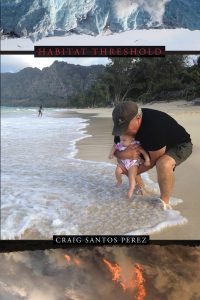Yvonne, a graduate student who wrote her thesis on Native American eco-criticism, picks me up in a hybrid Prius from the Kaoshiung airport. On the sidewalks, adults walk to work and children walk to school wearing breathing masks. Is the smog here made in China? A man sits crosslegged, meditating, amidst the crowd.
What is the sound of a 1,000 mopeds revving?
Monkeys line the road to the multi-species National Sun Yat-Sen University. The faculty and graduate students I meet study the environmental humanities. I read my eco-poetry to them and discuss Pacific literature, sacred islands, and environmental justice.
They ask about Trump, who called the president of Taiwan a few days before I arrived. I bow my head in shame.
The next day, Yvonne drives us to the Taiwanese Indigenous Cultural Center. Our English language guide wears a Baltimore Orioles jersey, made in China. Tourists wear masks and cough during the show. After, we go to the museum. The museum tour guide wears a mask with the insignia: “Polar Bear.” He alternates between talking and coughing.
During lunch, Yvonne orders us beer made in Taiwan. It tastes universal. Then we drive further up the mountain and stop to eat cold Taiwanese jelly. It tastes local. We drive even further up the mountain until we arrive at the village of Wutai. Elementary school kids weave baskets on an open-air American basketball court. There’s a colorful mural that tells a harvest story. “There used to be a river flowing through the mountains,” Yvonne says. “Before the dam.” The riverbed is the color of concrete.
Yvonne suggests I sleep during the long drive back to the city. Two hours later, the sound of a 1,000 mopeds wakes me. We enter the underground parking garage of an 85-story skyscraper in Kaoshiung. We take the elevator to a fancy buffet restaurant on the 39th floor. Hsinya, the professor who sponsored my visit and co-editor of Aspects of Transnational and Indigenous Cultures, joins us for dinner. I fill my plate with fresh local fish and roast beef imported from Australia. I thank Hsinya for publishing my poem, “13 Ways of Looking at a Glacier,” in the Newsletter of the Comparative Literature Association of the Republic of China. I joke that a Pacific Islander poem about the Arctic appearing in a Chinese literary journal is either a “climate anomaly” or “the new normal.”
In the morning, Yvonne drives me to the airport. The meditating man has either gone to work or he has transcended the quotidian. I wish I could transcend the long check-in line for my flight. While waiting, I don a breathing mask in order to fit in. I grow accustomed to wearing the mask; it feels like my own private quarantine. As the plane takes off towards the turbulent horizon, I start to feel nauseous. I hope there’sa doctor on board. And by “doctor,” I don’t mean someone with a Ph.D. in the environmental humanities.
Hours later, we begin our bumpy, alt-right descent into America. At the airport, I follow the crowd towards “Global Entry.” “Take off your mask and look at the camera,” the white customs officer commands. I wonder: can the software facially recognize my disgust with the American electorate? He grabs my passport, like Trump grabs pussy, and stamps it with the salute of a new era. I claim my baggage, take off my mask, and cough. I have something dangerous to declare.
__________________________________

From Habitat Threshold. Used with the permission of the publisher, Omnidawn. Copyright © 2020 by Craig Santos Perez.
Craig Santos Perez
Craig Santos Perez is the author of four books of poetry, co-editor of three anthologies of Pacific literature, and cofounder of Ala Press. He is an indigenous Chamorro from the Pacific Island of Guam and, in 2010, was recognized in a resolution by the Guam Legislature as "an accomplished poet who has been a phenomenal ambassador for our island, eloquently conveying through his words, the beauty and love that is the Chamorro culture." He lives in Aiea, Hawai'i.













